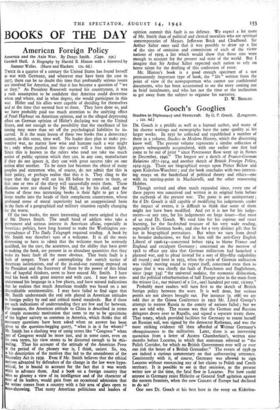Gooch's Googlies
Studies in Diplomacy and Statecraft. By G. P. Gooch. (Longmans. . 12s. 6d.) DR. Gooch is a prolific as well as a learned author, and many of his shorter writings and monographs have the same quality as his larger works. In 1931 he collected and republished a number of them in a volume, Studies in Modern History, which the discerning know well. The present volume represents a similar collection of papers subsequently accumulated, with one earlier one that had come to be out of print " since Paternoster Row went up in flames in December, 1940." The longest are a sketch of Franco-German Relations 1871-1914, and another sketch of British Foreign Policy, 1919-1939. There are biographical essays upon Prince Billow and upon Kiderlen-Waec.hter ; and the book concludes with two interest- ing essays on the borderland of political theory and ethics—one with its starting-point in Machiavelli, and the other reassessing Hobbes.
Though revised and often much expanded since, every one of these papers was conceived and written in its original form before the outbreak of the present war. The point is not unimportant ; for if Dr. Gooch is still capable of modifying his judgements under the impact of events, it is difficult to think that some of them might not have been modified. And yet it is not for his judge- ments—at any rate, for his judgements on large issues—that most of us read Dr. Gooch. We read him for his copious and exact learning, for the far-fetched treasure of his very wide reading, especially in German books, and also for a very distinct gift that he has in biographical portraiture. But when we turn from detail to broader deductions, we find in him still the anti-Grey English Liberal of 1906-14—concerned before 1914 to blame France and England and exculpate Germany ; concerned on the morrow of 1918 to efface any idea that German militarism had launched a planned war, and to plead instead for a sort of fifty-fifty culpability all round ; and later in 1935, when the cycle of German militarism was visibly moving round to repeat itself, concerned even then to argue that it was chiefly the fault of Frenchmen and Englishmen, since (page 334) " the universal malaise, the economic dislocation, and the political rebarbarisation of half Europe arise in the main from the misuse (i.e., our misuse) of a (i.e., our) hundred per cent. victory."
Probably most readers will turn first to the sketch of British foreign policy between the wars. It is well done, but serious points are not always brought out. For instance (p. 168) we are told that at the Genoa Conference in 1922 Mr. Lloyd George's attempt to restore Russia to the comity of nations failed ; but we are not told why. The reason was that the German and Russian delegates drove over to Rapallo, and signed a separate treaty there. That treaty, which provided facilities for Germany to rearm herself on Russian soil, was signed by the democrat Rathenau, and was the most striking evidence till then afforded of Weimar Germany's obsequiousness to the militarists. Later, there is an interesting quotation from a letter of Austen Chamberlain's, written nine months before Locarno, in which that statesman referred to "the Polish Corridor, for which no British Government ever will or ever can risk the bones of a British Grenadier." The events of 1938-39 are indeed a curious commentary on that unforeseeing utterance. Consistently with it, of course, Germany was allowed to sign Locarno without renouncing any of her claims to Polish and Czech territory. It is possible to see in that omission, as the present writer saw at the time, the fatal flaw in Locarno. For how could anyone in Germany resist Hitlerite or General Staff agitation against the eastern frontiers, when the new Concert of Europe had declined to do so?
One sees Dr. Gooch at his best here in the essay on Kiderlen- • Waechter, the "man of Agadir." Most of us know of him as one of those queer hybrids between Junker roughness and diplomatic subtlety, of which Bismarck himself furnished the supreme example. Kiderlen was not a Bismarck on any showing, but there was much in his career which suggested higher capacity than was actually revealed under his chief test—the handling of the Agadir crisis. His death (by a stroke) in December, 1912, was quite unexpected, and but for it he might have been Germany's Foreign Minister after Serajevo, instead of the feeble.Jagow. R. C. K. ENSOR.























 Previous page
Previous page